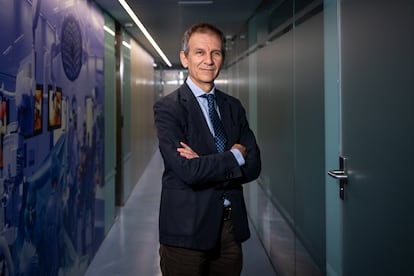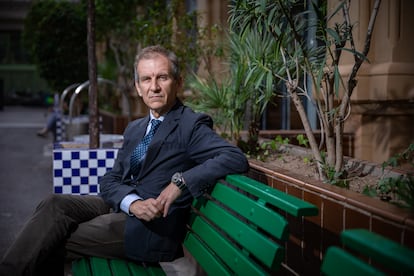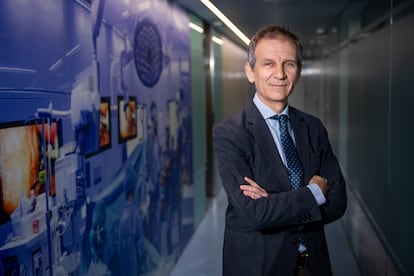Dr. Antonio Alcaraz has done 1,600 organ transplants: ‘My first uterus felt like stepping on the Moon’
With over 30 years of experience, the skilled urologist recently helped implant a womb in a woman who was born without one

Less than 12 hours have passed since the skilled hands of Dr. Antonio Alcaraz worked their magic in the operating room, transplanting a life-giving kidney. And after this interview, he is heading right back into surgery for yet another organ transplant. The man is unstoppable. “There is something addictive about an operating room, especially when I’m there for transplant surgery,” he said. With over three decades of experience, the urologist overseeing the kidney transplant program at Hospital Clínic de Barcelona has successfully conducted more than 1,600 surgeries as the lead surgeon. “I’ve probably done more of these organ transplants than anyone else in Spain,” said Alcaraz. But he has a distinct numerical advantage. “There’s only one liver, but two kidneys,” he jokes. The hospital where he works has done around 5,000 kidney transplants, the most in Spain.
These procedures have something magical about them, he says over and over again. As a young resident, he would sneak into operating rooms at all hours to watch, hoping for a chance to lend a hand. “If I was lucky, they would let me scrub in. Otherwise, I would shadow the surgeon, hoping to catch a glimpse.” He assisted in hundreds of transplants before he got his chance to be the lead surgeon in June 1990. He remembers the day like it was yesterday. “I was young and it was a fairly simple transplant. My mentor [Dr. Roberto Talbot-Wright] was assisting me. I remember that detail because I was so meticulous with my sutures, he told me, ‘Antoniño, this is stitching, not embroidering. Hurry up!’”
Dr. Alcaraz pioneered robotic surgery for kidney transplantation at the Clinic. He holds the distinction of being the first to perform a tumorous kidney removal through the vagina, a groundbreaking achievement. Additionally, he played a crucial role in Spain’s first successful uterus transplant, culminating in the joyous birth of a baby several months ago. One never stops learning, he says. Or caring. While he’s working, the doctor can seem cold and distant, but when interacting with patients, he sheds the white coat and warmly connects on a more personal level. Children hold a special place in his heart because of their vulnerability and the complexities of those procedures.
A few minutes before he has to scrub and put on a surgical gown again, the doctor says he still has plenty of energy. At 62 years old, he has lots of ideas and no plans to retire, but acknowledges his own mortality. “The cemeteries are full of indispensable people,” he said. He’ll retire someday, but it won’t be today or tomorrow. The operating room awaits.
Question. Why is an organ transplant magical?
Answer. You are using something from one person to restore life in another. The recipient changes because they now have a body part from another person. And then there is the organ donor. Imagine a person who is capable of giving away part of their body so that someone else can heal.
Q. You say the operating room is addictive. What do you feel when you’re there?
A. It’s my natural habitat, a sanctuary that gives me immense tranquility. I We have to weigh the risks for each patient, the likelihood of success and their quality of life post-transplant. We need to be sure that we make the right decisions not just for one patient, but for all our patients. Ultimately, I think it’s important to remember that no matter how hard it gets, every patient counts. That’s why we are can shield myself from the outside world and focus solely on the task at hand. It’s a hefty responsibility, one with no room for error. While it’s true that many people have the manual dexterity to become surgeons, that’s not the defining factor. Surgery, to me, is an intellectual exercise that requires meticulous planning, strategic thinking and skilled execution. And let’s not forget the importance of emotional control.
Q. You have to be ice cold?
A. Exactly. You have to be very calm. Last week we had a man with a tumor and a blood clot in the cava [vein]. We were performing a laparoscopic procedure, but since we didn’t tighten one of the tensioners properly, we had two liters of blood loss. But you must have the composure to adjust and not lose control.
Q. Can you ever lose your cool?
A. No. You can get irritated when something isn’t right, but I try not to. You can’t let your moods affect others because the whole team can lose control. You need to establish a sense of calm and control.
“Donors are like God, nothing must happen to them”
Q. Have you ever taken off that armor when you’re with a patient?
A. Yes, but only before and after [surgery], never during. Take children, for instance. Operating on them affects me a great deal. Their vulnerability in the operating room forces me to detach completely.
Q. Doesn’t that dehumanize your care of the patient?
A. I don’t think so. I’m told that I have good rapport with patients during my pre-surgery visits. I convey a lot of calmness and confidence. I try to be approachable and never wear a white coat because I believe it creates a barrier.
Q. You said that children were special. Do they intimidate you more?
A. Yes. Children are a very special responsibility because they have their whole lives ahead. Maybe 80 or 90 years, which is a lot of life. We must strive to ensure that their quality of life is high.

Q. Have you ever cried after leaving the operating room?
A. Of course I’ve cried. There are very few deaths during the surgery itself, but I have experienced a few. It’s a feeling of total helplessness. I remember a 25-year-old girl with a renal mass who died and… well... you feel like dying too.
Q. Do you take those patient stories home with you?
A. Yes. When I was younger, I was always thinking about patients. Over time, you learn to leave them at the hospital. You become more cerebral, more analytical and less emotional, which is good for the patient. Experience is also about being able to set aside emotions and make very objective decisions. We like to do transplants – it’s tough for us to say no to a transplant. But sometimes not doing a transplant is the wisest choice. Technically, everything can be transplanted, but just because it can be done doesn’t mean it should be. Organ transplants also have risks and mortality.
Q. You mentioned that you have been instrumental in the development of uterine transplants. You said it was a challenging procedure. What is the level of complexity?
A. Very high – it pushes you to your limits. You have very small vessels and the non-pregnant uterus has poor vascularization, so you have to search for arteries that can be safely sewn. We perform the extraction robotically, which is where we need the anatomical knowledge of a gynecologist. We [surgeons] know what can and can’t be transplanted, and how far we can go.
Q. And when you’re successful, what goes through your mind?
A. We did it! There are three or four surgical milestones in my career that I consider especially significant. This one [uterus transplant] was the most complex surgery I have ever done. It’s like finishing your first marathon – complete satisfaction. A uterus transplant also has an important emotional component, especially when you get to know the mother. So, when you finish [the procedure] and see it [the uterus] turn red with blood circulating, you say to yourself, ‘This is amazing!’ For me, it was like stepping on the Moon. There’s no greater joy.
“Technically, everything can be transplanted, but just because it can be done doesn’t mean it should be”
Q. So, it’s technically possible, but is it worth the risk when it’s not a vital organ?
A. I have an opinion, but it’s worth very little – just one among 47 million [the population of Spain].
Q. What’s your opinion?
A. I think that’s a decision for society. It has to be made by much more qualified people than me. My own opinion is that infertility is a disease and [the uterus] is not a vital organ, so one can live without having children. But some people are heavily affected by it and many lives have been ruined by the inability to have children. Infertility should not be trivialized. Some women have committed suicide because they can’t have children. If there’s a woman who cannot have children because she was born without a uterus, yet she bravely chooses to undergo the surgery despite the risks, who am I to stand in her way? But it’s a different matter at the societal level. Should the public healthcare system cover this type of intervention? I think so, but others may think differently.
Q. You said that although technically everything can be transplanted, surgeons must always gauge how far they should go. How far can you go?
A. I believe that there are uncharted territories for us to explore. Take kidney transplants, for instance. We should strive to find ways to eliminate rejection, such as using genetically modified animal organs that are readily accepted [by the human body]. We should also delve into the realm of creating artificial organs for implantation. Despite the commendable efforts of Spain’s National Transplant Organization (ONT), it’s disheartening to see a waiting list of 4,000 patients.
Q. What lines should not be crossed?
A. The ethical boundaries are very clear – do no harm is one such boundary. We do many transplants of organs donated by living people, so we think about this a lot. Above all, protect the donor – they are like God, nothing must happen to them.

Q. The ONT has eased [thanks to the increased availability of organs and scientific evidence] the criteria for patients with alcoholic hepatitis to have access to liver transplants. They no longer have to meet the requirement of six months of abstinence from alcohol. But are there any abstinence requirements based on how the transplant recipient’s body will receive the organ?
A. That’s a key question, and one that makes doctors uneasy. We shouldn’t try to assign blame, but patients must value the treasure they have been given by a donor with unbounded generosity. There is also the matter of organ economics – it’s a limited resource and we need to strive for fair distribution.
Q. What else can be done in robotic surgery? Can a robot someday replace Dr. Alcaraz?
A. Robotics provides precision. Can it be automated further? Without a doubt. When I manually perform sutures, even with the assistance of a robot, it’s ultimately me who guides the arm. However, there may come a time when the robot performs the sutures on behalf of the surgeon. Nevertheless, I firmly believe in the importance of surgeons maintaining control. The role of robots is to enhance the skills of a competent surgeon.
Q. Are there any aspects of transplants that you’re eager to explore, but haven’t had the chance to delve into yet?
A. I would love to transplant a liver or other organs. But well, since that’s not realistic and my colleagues do it wonderfully, let cobblers stick to mending shoes. But there are other organs that could be transplanted, like the bladder. I would also like to perform a transplant remotely, for example, on a patient in Australia. It would be a remote surgery to assist teams in other locations, but with the ability to take control of the procedure.
Q. You’re 62 years old. Do you see yourself anywhere else besides an operating room?
A. The operating room has something addictive about it, and organ transplants even more so. Surgery is my life, and it will really be very difficult to leave the operating rooms. It’s like when you are used to playing in the Champions League – you don’t want to end your career in the second division. You want to finish with dignity and play your last match in the Champions League. Currently, I find myself in excellent physical and mental health. I’m in a very creative phase, and feel that I am at the pinnacle of my capabilities as a surgeon.
Sign up for our weekly newsletter to get more English-language news coverage from EL PAÍS USA Edition
Tu suscripción se está usando en otro dispositivo
¿Quieres añadir otro usuario a tu suscripción?
Si continúas leyendo en este dispositivo, no se podrá leer en el otro.
FlechaTu suscripción se está usando en otro dispositivo y solo puedes acceder a EL PAÍS desde un dispositivo a la vez.
Si quieres compartir tu cuenta, cambia tu suscripción a la modalidad Premium, así podrás añadir otro usuario. Cada uno accederá con su propia cuenta de email, lo que os permitirá personalizar vuestra experiencia en EL PAÍS.
¿Tienes una suscripción de empresa? Accede aquí para contratar más cuentas.
En el caso de no saber quién está usando tu cuenta, te recomendamos cambiar tu contraseña aquí.
Si decides continuar compartiendo tu cuenta, este mensaje se mostrará en tu dispositivo y en el de la otra persona que está usando tu cuenta de forma indefinida, afectando a tu experiencia de lectura. Puedes consultar aquí los términos y condiciones de la suscripción digital.









































